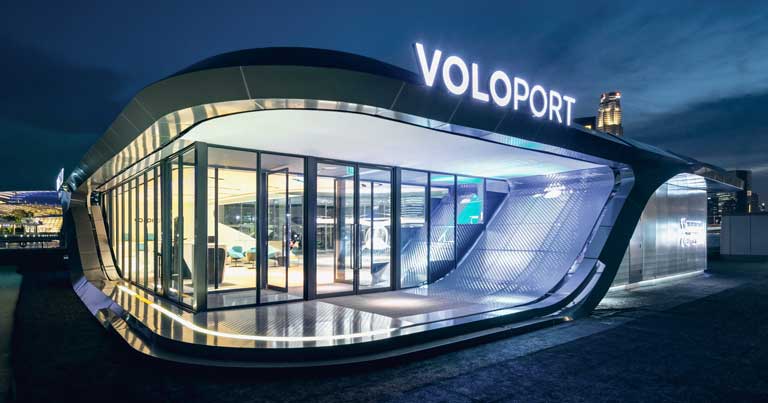
A new company focused on sustainable mobility has been set up by Aeroporti di Roma, Aeroporto di Venezia, Aeroports de la Cote d’Azur and Aeroporto Guglielmo Marconi di Bologna. The new venture, called Urban Blue, has been launched with the aim to accelerate the development of urban air mobility infrastructures internationally.
It will oversee the design, construction, and management of eVTOL infrastructure, also known as vertiports, which will be essential to allowing eVTOLs to connect airports with built-up areas and promote intra-city mobility.
The company will rely on the existing partnership with Volocopter, and will remain open to new industrial, technology, and financial partners wanting to participate in expanding the programme across the world.
Furthermore, EDF Invest, shareholder of Aeroports de la Cote d’Azur, will support Urban Blue as an international player of reference in the innovative and sustainable mobility segment.
The start of operations in Rome, Nice and Venice is currently planned for 2024, with plans to extend the project in other countries of interest.
In an initial phase, Urban Blue will carry out technical-economic feasibility studies and masterplans, in coordination with all the stakeholders of the new ecosystem, preparatory to the authorisation phase and the subsequent construction and management of the vertiports.
“The development of Urban Air Mobility is part of our strategy of strong acceleration on innovation and sustainability and allows us to further enhance our infrastructures’ development and management skills,” commented Marco Troncone, CEO of Aeroporti di Roma. “We are working in synergy with all the stakeholders and industrial partners to design the ground structures within the overall ecosystem, aiming at the operational start-up of this service with a challenging but possible timeline, to allow Rome to be among the first cities in Europe to activate this kind of connections, already in 2024, before the beginning of the Jubilee ”.
Monica Scarpa, CEO, SAVE Group, added: “The Urban Air Mobility development project is part of our commitment to achieve zero CO2 emissions by 2030, included in the roadmap delivered to ACI Europe (Airports Council International) whose general meeting, underway in Geneva today and tomorrow, deals with sustainability and innovation path of airports. The goal is to build a vertiport in the Venice airport by 2024 for vertical take-off electric vehicles, which will relieve from traffic congestion the urban areas around Venice Marco Polo airport”.
“As the laboratory for the airport of tomorrow and the leading carbon-neutral French airport group, Aéroports de la Côte d’Azur aims to amplify the effects of the energy transition of air transport and to anticipate new uses,” said Franck Goldnadel, CEO, Aeroports de la Cote d’Azur. “As the manager of airports located in a landlocked territory, between sea and mountain, at the heart of urban but also industrial areas, the Group anticipates the diffusion of this new form of mobility in the short term. This is why participating in the creation and development of Urban Blue is not only part of our strategy but also of our convictions in terms of sustainable mobility.”
“The Urban Air Mobility represents a stimulating challenge, capable of mobilising new resources and skills and project ourselves into a future of innovative and sustainable mobility,” said Nazareno Ventola, CEO of Bologna Airport. “Aeroporto di Bologna SpA wants to be protagonist of this future and the partnership that we are going to develop is an opportunity to be fully seized and exploited, in the interest of our shareholders and our stakeholders”.
Christian Bauer, CCO of Volocopter, also commented: “We have shown the world repeatedly that our aircrafts can fly. But Urban Air Mobility can only work with the necessary ecosystem around it. A renowned infrastructure partner like Aeroporti di Roma creating a company like Urban Blue that will build vertiports, the take-off and landing infrastructure, plays an integral part in bringing electric air mobility to cities. For the digital infrastructure that can orchestrate the whole ecosystem, we are also building the VoloIQ platform.”
The urban air mobility (UAM) market is projected to grow from $2.6 billion in 2020 to $9.1 billion by 2030. Just this year, investment in the industry has skyrocketed with $4.7 billion announced for the development of eVTOL vehicles. Recent technological advancements and the need for more affordable, rapid and sustainable travel are driving this trend forward. FTE recently looked into the state of the UAM industry, some of the most recent developments, and the opportunities and challenges facing the aviation industry. Read the full story here.






